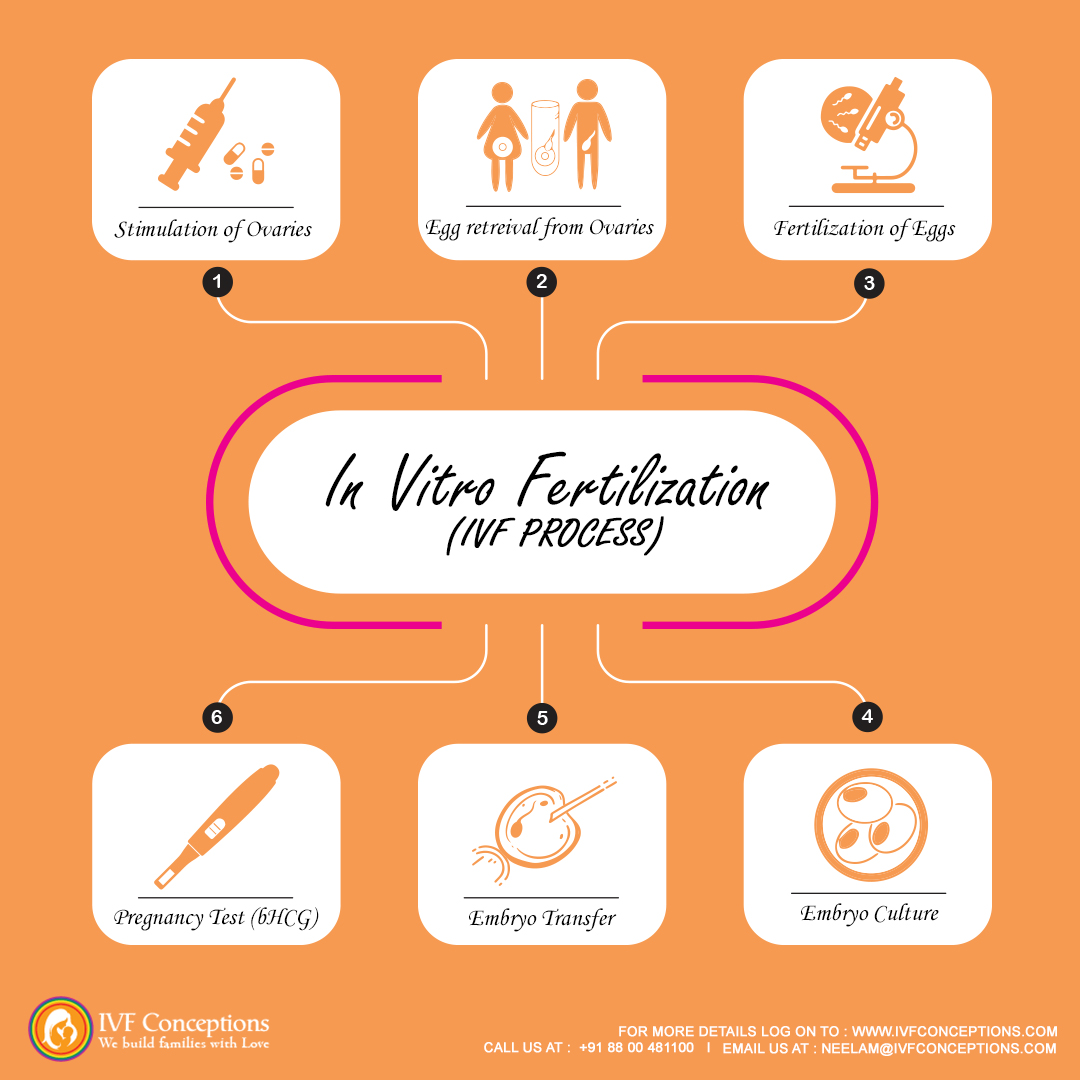10 tips for a successful IVF cycle after a failed IVF
In today’s modern world, Assisted Reproductive Technology (ART) has transformed the lives of countless individuals and couples, making dreams of parenthood achievable through procedures like in vitro fertilization (IVF).
IVF has become a beacon of hope for those facing infertility challenges. According to the Centers for Disease Control and Prevention (CDC), IVF contributes to around 1.7% of all births in the United States. In this article, we will learn about tips for successful IVF and much more!
If you’re considering IVF as a pathway to parenthood, it’s essential to understand the key factors that impact your chances of success. At IVF Conceptions, we’re dedicated to guiding you through this journey, ensuring you’re well-informed and empowered to make the best decisions for your unique situation.
IVF (in vitro fertilization) is a boon for couples who are suffering from infertility. Not only heterosexual couples but also same-sex couples can go to IVF surrogacy to have a family. In IVF the egg is first fertilized and then it is transferred to the surrogate mother’s uterus or the intended mother’s uterus. But IVF does not guarantee 100% success. It is possible that you might need one or many attempts of IVF cycles to confirm pregnancy.
There are chances that fertilization treatments may fail. So, now what one should do? One should not worry too much and decide to go for the second IVF cycle. But before switching to the next cycle of IVF, it is important to understand what went wrong the first time and how to correct it on the second attempt.
Contact us directly for a free consultation!🤝
📲 +91-8800481100 ( WhatsApp, Line, Viber)

 The main reasons for the failure of IVF include the following –
The main reasons for the failure of IVF include the following –
#1. Chromosomal abnormality
Chromosomal abnormality is one of the reasons why the IVF cycle can fail. In this case, it is important to know the reason for the failure of the cycle and then to prevent the embryos with chromosomal defects from being transferred.
To do so, the intended parents are advised to go for a genetic testing procedure like – Next Generation Sequencing (NGS) or PGD
NGS is the latest genetic screening test and comprehensive chromosome testing of embryos created through IVF. It allows embryologists to screen for defects on the chromosomal level with higher accuracy and more detail than ever before.
#2. Inadequate Endometrial thickness
Endometrial thickness plays an important role in planting the embryo in the uterus. The normal range of the endometrial wall is 8mm to 11mm. If the uterine thickness does not lie within this range then it can be a reason for the failed IVF cycle.
Again, it is important to know the reason and then prescribe medicine that will help the endometrial walls to come within the normal range of thickness and then attempt the second IVF cycle.
If the intended mother has some serious defect in the uterus like infection or fibrosis or partial uterus, then it is advised to undergo gestational surrogacy to enhance the chances of success.
#3. Poor quality of the gametes
The quality of the eggs and sperm plays an important role in the success of the IVF cycle. Blastocyst transfer (Day 5 embryos) are recommended by most fertility doctor.
If the egg or the sperm is of poor quality then it may lead to the failure of the IVF procedure. That is why the success rate of IVF is best in young couples and diminishes with the age of the egg donor (mother) and sperm donor (father). Fertility drops drastically in female parents, that is why the parents are advised to do IVF with an egg donor if the female partner is above 40 years of age.
More resources:
Infographic- How Does IVF Egg Donor Process Work?
Surrogacy Success Rates- What You Need to Know
#4. Implantation failure
The most common implantation failure includes thin endometrium lining, immunologic dysfunction, poor quality of embryos, and low progesterone levels.
Now you are aware of the failure of the IVF cycle. So, what things should be kept in mind to have a successful IVF procedure?

 Mastering the Stages of IVF
Mastering the Stages of IVF
The IVF process is a complex and multi-stage journey, each phase contributing to the ultimate goal of achieving a successful pregnancy. Let’s delve into the intricacies of each stage:
Stage 1: Preparation
Prior to commencing your IVF treatment, our experienced fertility team will collaborate with you to create a tailored plan. This may involve lifestyle adjustments to optimize your body’s readiness for the upcoming procedures. By making these changes, we enhance your body’s receptivity to the treatment and create a supportive environment for success.
Stage 2: Commencing Your IVF Cycle
Embarking on your IVF cycle marks an exciting milestone in your journey. The first day of your menstrual cycle, commonly referred to as “Day 1,” initiates this stage. At IVF Conceptions, we ensure that you’re well-prepared and informed before this critical phase begins.
Stage 3: Ovarian Stimulation
Between days 3 and 12 of your cycle, our fertility experts will guide you through the process of ovarian stimulation. Customized fertility medication will be prescribed to stimulate your ovaries, promoting the release of mature eggs that are essential for successful IVF.
Stage 4: Trigger Injection
At a pivotal moment in your IVF journey, the trigger injection introduces human chorionic gonadotropin (hCG) to support egg release. Precisely timed, this injection optimizes egg retrieval, making it easier for our skilled team to harvest the eggs that will be vital in the next phases.
Stage 5: Egg Retrieval & Semen Collection
Harvesting eggs and collecting semen are integral components of the IVF process. Your partner’s or donor’s sperm will unite with your mature eggs in our state-of-the-art embryology lab, marking the beginning of a new life’s potential.
Stage 6: Implantation
Implantation day is a moment of anticipation and hope. Our dedicated team will gently transfer the embryo into your uterus. While slight cramping might be experienced, rest assured, our skilled professionals prioritize your comfort and well-being throughout this process.
Stage 7: Pregnancy Test
Around 9-12 days post-embryo transfer, you’ll visit us for a follow-up appointment. A combination of scans and blood tests will determine if pregnancy has been achieved. Our commitment to your journey extends beyond this moment, as we stand by your side throughout the entire experience.


10 Easy to Follow Tips For Successful IVF
#1. Go for more than one IVF cycle
The couples should always make sure they try at least three times before giving up on the IVF cycle trials. Research has shown that the odds of IVF success increase with the number of cycles done. Using the extra embryos will help couples have higher success rates and have their own babies victoriously. Instead of giving up, try to speak to your fertility consultants about what other options you can have.
#2. Go for a sperm fragmentation test
If the couple has a doubt about the sperm quality of the male donor or about the presence of any genetic abnormality, the couple can go for a sperm fragmentation test. This test will detect the genetic abnormalities in advance and even if the sperm quality is not of the desired range, the donor’s sperm can be used.
#3. Re-analyze the quality of eggs
In an IVF cycle, both eggs and sperm play a very important role to determine the success rate of the IVF cycle. The infertility specialist will advise you to go for an individual analysis of the gametes before forming an embryo. The quality checking of the gametes will enhance the chances of pregnancy.
#4. Go for a preimplantation Genetic diagnosis
Repeated failures in surrogacy trials in the case of IVF cycles lead to the necessity for Preimplantation Genetic Diagnosis (PGD). It is a reproductive technology whose main purpose is to screen and find out the genetic disorders that are more likely to pass on to the fetus. This test is indicated for couples with repeated cases of loss of pregnancy. If the embryos are not genetically fit, the donor egg or donor sperm can form new embryos.
#5. Try FET
FET stands for Frozen Embryo Transfer procedure. Since chances are good with the frozen embryo transfer it is advised to the mother who had undergone the IVF failure.
#6. Use donor eggs
In case the quality of eggs does not match those required for a successful IVF attempt, then one can use the donor eggs for sure.
#7. Partner with a good embryology clinic
The choice of an outstanding reproductive endocrinologist is twofold: search for someone with whom you feel comfortable and have knowledge and dedication to evidence-based medicine. On this very emotional journey, your doctor will accompany you and it is important that you feel supported and noticed. Ask friends and family for guidance for a competent doctor with whom you feel comfortable, but also make sure you do your homework.
#8. Optimize sperm health
Multivitamin use and proper body weight management, as well as the use of boxers over briefs, may improve the quality of sperm. Medications that can help boost sperm numbers and quality that can have a beneficial impact on IVF outcomes can also be started by men under appropriate care. Sperm aspired directly from the testis over ejaculate may also be effective in some situations. It is important to involve a male infertility specialist in semen analysis for any type of abnormality.
#9. Transfer more than one embryo
Upon consulting with the patient, the infertility doctor will choose to transfer more than 2 embryos so that at least one embryo can be successfully implanted. But multiple pregnancies, such as twins or triplets, can also result.
#10. Focus on patience and persistency
Most patients need more than one IVF cycle for successful conception. If your first phase has not been successful, your doctor may be able to adjust the medications to improve a follow-up. Other times, it simply means holding on to it. Try not to be discouraged by sub-optimal results and setbacks — you do all right. The biggest thing to remember is that most of this (or all of it) is out of your control. No one likes a lack of control, but letting go can also allow you to survive the trip. Take care of yourself and when things don’t go well don’t blame yourself.

 Conclusion
Conclusion
IVF success is within reach for each parent with a certain adjustment. Do not be disheartened with the first IVF failure and follow the above tips for a successful IVF Cycle.
Hence, you must keep calm and patient while going for IVF cycles as more than one cycle may be required. So, take the causes of the failure into consideration before opting for the second attempt.
If you’d like to learn more about IVF, Egg Donation, or surrogacy services globally, check out the rest of our website at IVF Conceptions.
Here are some FAQs for a blog post on “10 Tips for a Successful IVF Cycle After a Failed IVF”:
FAQs: 10 Tips for a Successful IVF Cycle After a Failed IVF
1. What should I do after a failed IVF cycle?
After a failed IVF cycle, it’s essential to consult with your fertility specialist to review your cycle and identify any potential issues. Take the time to emotionally process the experience before making any decisions about your next steps.
2. How long should I wait before trying IVF again?
Most doctors recommend waiting at least one full menstrual cycle (around 4-6 weeks) before beginning another round of IVF. This allows your body to recover and for any necessary adjustments to be made in your treatment plan.
3. Can lifestyle changes improve my chances of success in the next IVF cycle?
Yes, adopting a healthier lifestyle can increase the chances of IVF success. Focus on a balanced diet, maintain a healthy weight, reduce stress, quit smoking, and limit alcohol and caffeine consumption.
4. Should I change my fertility clinic after a failed IVF cycle?
Not necessarily. It’s best to have an in-depth conversation with your current clinic to understand what went wrong and whether they can offer new strategies for your next cycle. If you feel uncertain or dissatisfied with their care, seeking a second opinion may be helpful.
5. What medical tests should be done after a failed IVF cycle?
Your fertility doctor may recommend additional tests, such as genetic testing of embryos, a hysteroscopy, or blood tests to check for hormonal imbalances or other underlying conditions that may have contributed to the failure.
6. Is PGS/PGT-A testing recommended for the next cycle?
Preimplantation Genetic Screening (PGS), also called PGT-A, can be recommended after a failed IVF to ensure that only genetically normal embryos are transferred, potentially improving the chances of success.
7. Can changing the IVF protocol improve my chances?
Yes, sometimes changing the IVF protocol (e.g., adjusting medication dosages or trying a different stimulation protocol) can lead to better outcomes. Your doctor will customize the treatment based on your previous cycle’s results.
8. Does stress reduction impact IVF success?
Yes, high levels of stress may negatively impact fertility. Engaging in stress-reducing activities such as yoga, meditation, or acupuncture may help improve your overall mental and physical well-being, supporting your next IVF cycle.
9. Should I consider using donor eggs or sperm after a failed IVF?
If egg or sperm quality was a factor in the failed cycle, your doctor may suggest using donor eggs or sperm in the next cycle. This decision depends on individual circumstances and test results.
10. How can I stay positive after a failed IVF cycle?
It’s natural to feel disappointed after a failed IVF attempt. Surround yourself with supportive family, friends, or a counselor specializing in fertility challenges. Maintaining hope and a positive mindset, while difficult, can make a big difference during the IVF journey.

